Officials concerned Iran may be emboldened after Trump appears to dismiss incident as a possible accident; White House invites House, Senate leaders for briefing
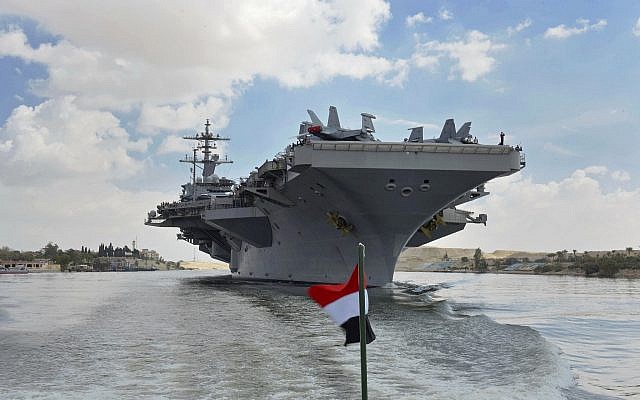
Israel officials are reportedly concerned over the prospect that the US will not response decisively to Iran’s downing of an American drone in the Persian Gulf, with some worried Iran will interpret this as an unwillingness to engage in military operations against it and grow more aggressive in the region.
A report on Channel 13 news Thursday, citing unnamed Israeli security sources, suggested officials interpret Iran’s decision to shoot down the drone as a test of the Trump administration’s resolve. The sources are reportedly worried about what they see as a hesitant response by the US thus far, which they fear could undermine the credibility of American warnings in future and encourage Tehran to up its attacks throughout the region.
The Israeli fears were sparked when Trump suggested in comments from the White House on Thursday that the incident might have been a mistake executed by someone in the Iranian military just being “loose and stupid.”
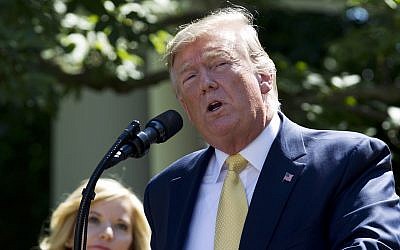
Trump added: “I find it hard to believe it was intentional.”
The Israeli concerns will come up in discussions between the national security advisers of Israel and the US, who are set to meet in Jerusalem next week along with their Russian counterpart for talks on regional security and Iran.
Earlier Thursday, Trump responded to the downing of the RQ-4 Global Hawk drone on Twitter, saying Tehran had made a “very big mistake” in shooting down the US spy aircraft near the strategic Strait of Hormuz.
“This country will not stand for it, that I can tell you,” he told reporters at the White House.
Asked by a reporter if he plans to order a strike against Iran in response, Trump said: “You will find out.”
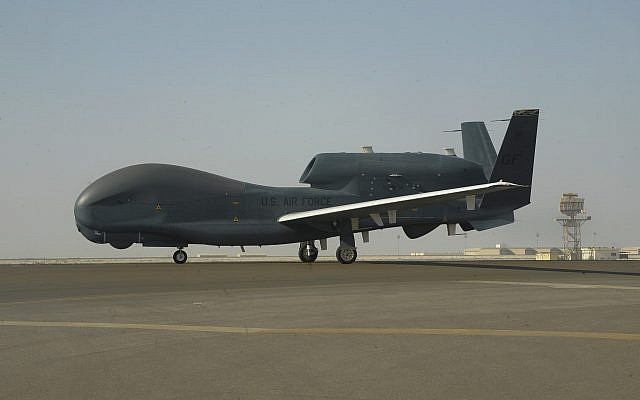
Meanwhile, Prime Minister Benjamin Netanyahu gave his backing to Trump, appealing to “all peace-loving countries” to support American efforts to halt what he called escalating Iranian provocations.
Speaking Thursday at a reception in Jerusalem for New England Patriots owner Robert Kraft, Netanyahu said that “in the last 24 hours, Iran has intensified its aggression against the United States and against all of us,” adding that “Israel stands by the United States and its military.”
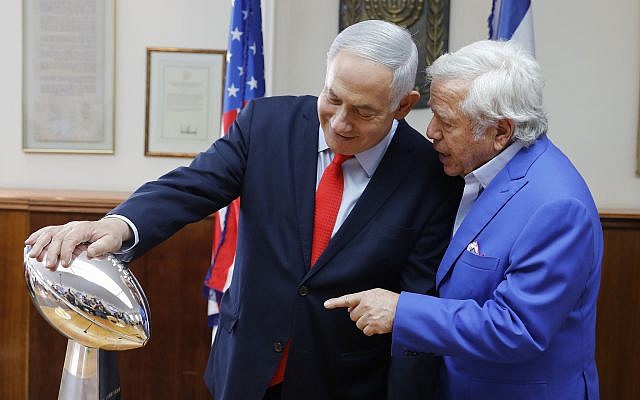
In Washington, however, skepticism over US options abounded, with Democrats urging the White House not to be “reckless.”
The White House invited House and Senate leaders for a briefing with Trump on Thursday afternoon to discuss tensions with Iran.
In addition to House and Senate leaders of both parties, the White House extended the invitation to the top Democrats and Republicans on the House and Senate intelligence and Armed Services committees.
While the US military’s Central Command was adamant that the attack was “unprovoked” and had taken place “in international airspace,” Iranian officials claimed Thursday it had entered Iran’s airspace before it was fired upon.
Iran’s foreign minister, Mohammad Javad Zarif, charged on Twitter that the drone had “violated Iranian airspace” and that parts of the aircraft were retrieved “in OUR territorial waters where it was shot down.”
At 00:14 US drone took off from UAE in stealth mode & violated Iranian airspace. It was targeted at 04:05 at the coordinates (25°59'43"N 57°02'25"E) near Kouh-e Mobarak.
We've retrieved sections of the US military drone in OUR territorial waters where it was shot down. pic.twitter.com/pJ34Tysmsg
— Javad Zarif (@JZarif) Hunyo 20, 2019
The downing of the drone came as Iran was already accused by Washington — as well as allies Saudi Arabia, Germany and others — of having carried out bomb attacks on two oil tankers in the congested Hormuz area. Tehran denies having been behind the attacks but has frequently threatened in the past to block the sea lanes used by ships to move much of the world’s oil exports.
It also came after the US military alleged Iran had fired a missile last week at a drone that was responding to an attack on the two oil tankers, and blamed pro-Iran Shiite militias for half a dozen attacks on US installations in Iraq over the past two weeks.
In recent weeks, the US sped up the deployment of an aircraft carrier battle group to the Mideast and deployed additional troops to the tens of thousands already in the region, amid heightened tensions between the US and Iran following Trump’s decision to withdraw from Tehran’s 2015 nuclear deal with world powers a year ago. That move led to slapping biting US sanctions on Iran’s oil sector and other industries.
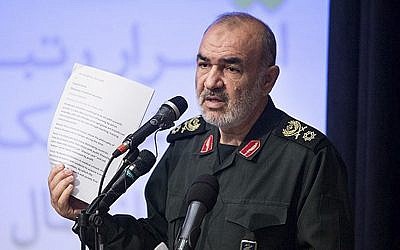
Iran recently quadrupled its production of low-enriched uranium and threatened to boost its enrichment closer to weapons-grade levels.
After the drone was shot down, the commander of the Iranian regime’s Revolutionary Guard said that the act had sent “a clear message” to America.
In comments carried live on Thursday on Iranian state television, Gen. Hossein Salami also said that Tehran does “not have any intention for war with any country, but we are ready for war.”
Salami, speaking to a crowd in the western city of Sanandaj, described the American drone as “violating our national security border.”
“Borders are our red line,” Salami said. “Any enemy that violates the borders will be annihilated.”
As reported by The Times of Israel
